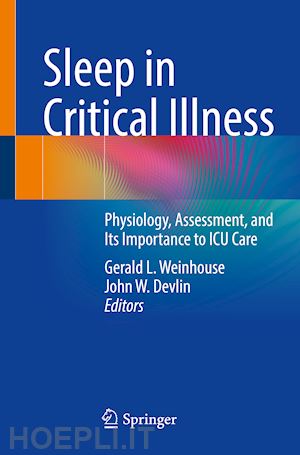
Questo prodotto usufruisce delle SPEDIZIONI GRATIS
selezionando l'opzione Corriere Veloce in fase di ordine.
Pagabile anche con Carta della cultura giovani e del merito, 18App Bonus Cultura e Carta del Docente
For decades heavily sedated ICU patients were assumed to be asleep. However, in the past 20 years, physiologic and epidemiologic studies have established sleep is frequently disrupted in the ICU. The inter-relationship between ICU sleep, delirium, and survivorship has come to the forefront of ICU practice. We now routinely aim for lighter sedation, delirium assessment has become standardized, and knowledge regarding the ICU factors leading to Post- Intensive Care Syndrome (PICS) has evolved. The importance of sleep in routine ICU management was codified for the first time in SCCM’s 2018 PADIS guidelines.
This state of the art book summarizes current knowledge regarding sleep during critical illness and recovery and how the risk factors, recognition, and outcomes associated with sleep in the ICU differ from those of healthy adults. Chapters address sleep quality in both the research environment and during routine care, the factors that disrupt sleep architecture and circadian biology in the ICU setting, medications that alter sleep architecture and those that can be used to improve it, the relationship between sleep and sedation and between sleep and delirium, and current strategies that can be used to improve sleep in the vulnerable ICU population. Written by experts in the field, Sleep in Critical Illness is a valuable resource for all members of the ICU interprofessional team including critical care physicians, nurses, physician assistants, pharmacists, and respiratory therapists as well as clinicians who consult in the ICU and post-ICU settings.
Gerald L. Weinhouse, MD
Division of Pulmonary and Critical Care Medicine
Brigham and Women’s Hospital
Boston, MA, USA
John W. Devlin, PharmD, MCCM
Department of Pharmacy and Health Systems Sciences, Bouve College of Health Sciences, Northeastern University
Division of Pulmonary and Critical Care Medicine
Brigham and Women’s HospitalBoston, MA, USA
Dr. Weinhouse has been a practicing, academic board-certified physician in pulmonary, critical care, and sleep medicine for the past 25 years. He completed his internal medicine residency at Boston City Hospital in 1989, spent 2 years doing a post-doctoral research fellowship at the Boston University Lung Center, then completed his pulmonary and critical care training at the University of Pennsylvania in 1995. He was a staff physician at the Mount Sinai Medical Center in New York City from 1995-1999 and then moved to Boston where he has worked at the Brigham and Women’s Hospital ever since. He is a full time clinical member of the Pulmonary/Critical Care division and has been the primary pulmonologist at the Dana Farber Cancer Center since 2007. His primary research interest has been in the relationship between sleep and recovery from critical illness. He co-chaired the sleep section for the 2018 SCCM’s Clinical Practice Guidelines for the Management of Pain, Agitation/Sedation, Delirium, Immobility, and Sleep Disruption in Critically Ill Adults. Dr. Devlin has been a critical care pharmacist for more than 25 years. He completed his pharmacy degrees at the University of Toronto, a residency in pharmacy practice at Victoria Hospital/University of Western Ontario, and a critical care research fellowship at Henry Ford Hospital. He is a professor of pharmacy at Northeastern University, and a critical care pharmacist and associate scientist in the Division of Pulmonary and Critical Care Medicine at Brigham and Women’s Hospital, Boston, MA. His research focuses on the detection, prevention and treatment of delirium and disrupted sleep in the ICU. He chaired SCCM’s 2018 Clinical Practice Guidelines for the Management of Pain, Agitation/Sedation, Delirium, Immobility, and Sleep Disruption in Critically Ill Adults.











Il sito utilizza cookie ed altri strumenti di tracciamento che raccolgono informazioni dal dispositivo dell’utente. Oltre ai cookie tecnici ed analitici aggregati, strettamente necessari per il funzionamento di questo sito web, previo consenso dell’utente possono essere installati cookie di profilazione e marketing e cookie dei social media. Cliccando su “Accetto tutti i cookie” saranno attivate tutte le categorie di cookie. Per accettare solo deterninate categorie di cookie, cliccare invece su “Impostazioni cookie”. Chiudendo il banner o continuando a navigare saranno installati solo cookie tecnici. Per maggiori dettagli, consultare la Cookie Policy.